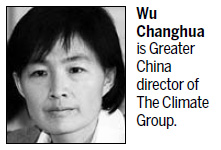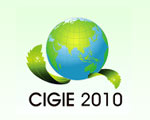International NGO advises China on carbon emissions
By Chen Weihua and Li Xing (China Daily)
2010-12-10 08:02
|
|

CANCUN, Mexico - Wu Changhua, Greater China director of The Climate Group, an international NGO, made a stir at the Copenhagen climate summit last year when she told a full-house audience of China's mitigation actions at a BBC television live debate with guest speakers including Danish Prime Minister Lars Lokke Rasmussen.
Since she returned, Wu has been shuttling from city to city across China - mostly at the invitation of local governments - for advice from her organization on ways officials can transform their municipalities into low-carbon cities.
She said she and her organization should be the major campaigners for a low-carbon and green revolution in Chinese cities.
"China is witnessing an unprecedented urban growth rate, which only looks set to accelerate," she told China Daily on Monday during China Day, an event organized by The Climate Group.
China's urban population reached 620 million in 2009 - an increase of 36 percent since 2000.
Moreover, China's urban population is becoming wealthier, consuming three-fourths of the country's energy - a proportion that is set to rise to 83 percent by 2030, she said.
In response to the combined pressure of rapid urbanization and central government targets on energy intensity, many Chinese cities have started to explore their own low-carbon leadership.
The central government has designated eight cities and five provinces to lead the country's low-carbon and green transformation.
However, during several interviews with China Daily, Wu said talking is easier than acting.
Many cities in the West, for example, have accumulated a lot of experience, but this is difficult for many Chinese city managers to emulate.
"They shoulder far more responsibilities than their counterparts in the West," Wu said.
For instance, a lot of cities in Europe no longer have heavy industries, so their mayors have more leeway to reduce emissions by improving energy efficiency in buildings, transportation and waste management, among other things.
In China, however, industries remain the principal engine for driving growth for city managers.
Chinese mayors are, first of all, held accountable for ensuring local industrial development and GDP growth so their cities' revenue can help support a social safety network, transportation, education and other forms of urban welfare.
Programs under the coming 12th Five-Year Plan (2011-2015) are expected to be implemented through more localized action plans that take into account the unique resources, knowledge and capabilities of each region of the country, Wu said.
Despite policy directives, cities must also find new engines to drive their transformation. Wind, solar or electrical cars are only a part of the low-carbon chain. There are other links, including investment, markets and logistics. For instance, city managers have to find the markets where they can sell and ensure revenue to fuel their green growth.
She cited a small county's ambition to nurture electrical car industry. "If the plants cannot sell the cars, the whole endeavor would be a waste of resources," she said.
There are a lot of questions that city managers and even so-called professionals and experts must be able to answer, she noted. These include what defines the low-carbon industry, where the market is and how to regulate green industries.
"We have to answer even the basic question: what are energy efficiency and emission reductions?" she said.
No one doubts Chinese cities' great potential in carving out a low-carbon footprint, but it will take a lot of time, she said.
However hard it is for China, it has no way out but to take up the challenge of the low-carbon revolution, Wu said.
"Without such a revolution, there will be no hope for the future of the world - nor prospect for the future of the 7 billion people in the world," Wu said.



